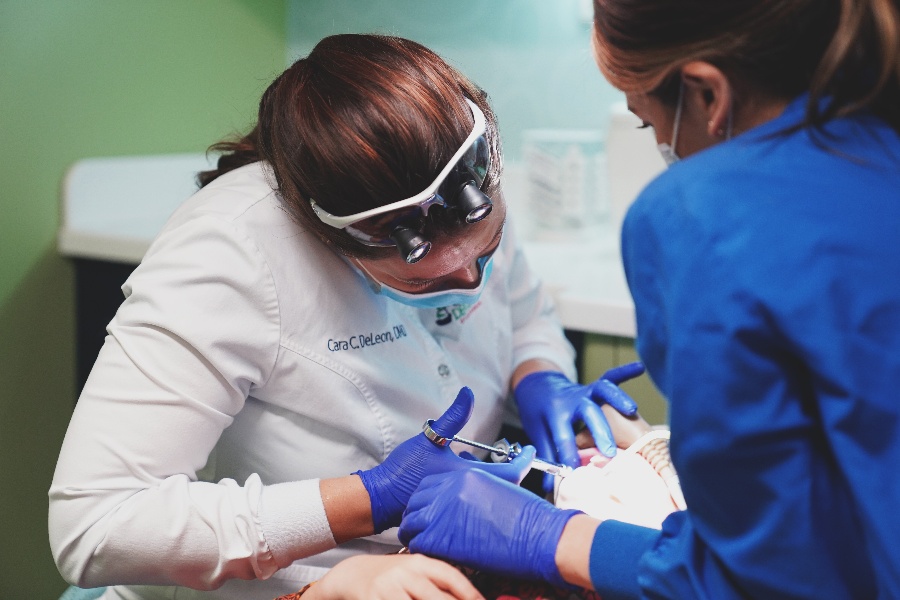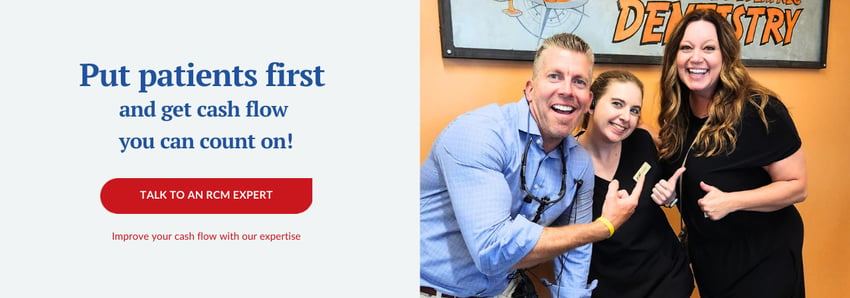Dental RCM: What is it and how can it take your dental practice to the next level?


Dental RCM refers to revenue cycle management for the dental industry. The term has been increasing in popularity because dentists are finally cracking the code on what can elevate their cash flow. And spoiler — the key is proper dental revenue cycle management. And you want in.
DCS is a full-service revenue cycle management provider that helps dentists and their teams thrive. We help dentists enjoy easy revenue collection from an optimized revenue cycle.
In this article, we’re going to cover:
- What dental revenue cycle management is
- 3 ways it can make your dental practice profitable and successful
- And how your revenue cycle management can be optimized
Let’s dive in.
What is dental RCM?
Dental revenue cycle management reduces the time between providing patient services and receiving payment. It maximizes income by identifying, collecting, and managing revenue throughout all dental business systems.
At a dental practice, your revenue comes from two sources: patients and insurance companies.
The way these two revenue sources are managed is the crux of your RCM. These two processes depend on one another, but they are handled very differently. Exactly how they’re handled makes a massive difference to your cash flow.
Can you tell that the phrase dental RCM in fact does hold a lot of weight?
Related: Why a profitable dental revenue cycle depends on a good billing process
Why is dental RCM crucial for running a profitable dental practice?
Dental revenue cycle management is crucial for your dental practice’s profitability. Although you’re a healthcare provider, you’re still a place of business. You offer a service and deserve to be compensated for it.
For example, think about your insurance billing process.
How, as a practice leader, would you describe the way your insurance billing process is managed? The insurance billing process is one piece of your revenue cycle. If it’s mismanaged you could miss out on thousands of dollars in insurance claims from tiny claim errors that result in denials or payment delays.
The processes you oversee and manage determine how easily you collect from both patients and insurance companies. Let us explain further.
Here are 3 reasons your practice needs revenue cycle management.
1. Dental RCM adds more structure to your dental practice
As we mentioned, dental RCM refers to the system for tracking services and collecting revenue, starting from when the patient schedules their appointment, to when they pay.
There are a lot of moving parts in between. Things can get lost in the mix, and slip through the cracks.
An airtight revenue cycle management system adds structure to the processes that ensure your revenue. This structure can take a few different forms:
- Standard operating procedures (SOPs) document each step of your billing processes
-
- Insurance verification process
- Insurance claim creation and submission process
- Patient collection process
- Insurance aging report process
-
-
- Appeals
- Claim research and follow-up
-
-
A person or service that expertly handles your billing processes
-
Hire a revenue cycle management service to take on time-consuming tasks so that your team can focus on patients
-
Prioritize training for the person handling your billing processes, or hire a service like DCS which trains the team assigned to help you
Related: How to close 90% of your claims fast: 3 ways a dental biller helps
Having SOPs and experts in place to manage your revenue cycle makes your practice easier to run and more profitable.
2. Dental RCM ensures that every step in the billing process is completed
When your RCM is optimized, you are confident that every step of the billing process is completed accurately.
Whether you’re using a service to optimize your RCM, or have taken steps to do so in-house, an ideal revenue cycle is completed without a stone unturned. This means that:
- Insurance verification was completed (properly) prior to the patient’s appointment,
- Claims are created and sent 24 hours after appointments
- The insurance aging report is worked at least once a week
- Payments are posted every day to the practice management software
- Patients are sent text and/or email reminders of their balance or appointment
Note - there are more steps to the revenue cycle, but for simplicity purposes, we have narrowed it down to these larger tasks. Dive deeper into the steps of the dental billing process in our Learning Center.
-1.jpg?width=647&height=431&name=DSC02155%20(1)-1.jpg)
Many dental teams struggle to complete these tasks because they have other responsibilities on their plate, and it can bring the revenue cycle to a grinding halt. Even small errors lead to claim denials. Denied claims often lead to thousands of dollars in uncollected revenue.
With optimized dental RCM, each task is completed accurately with the goal of maximizing your profitability.
3. Dental RCM gives your dental team targets and goals to reach
Expert revenue cycle management means you’re aware of your current numbers, and you know what numbers you (realistically) would like to achieve. Regularly running reports to analyze your numbers can help you determine targets and goals for your dental team.
This incentivizes your team to collect more or bring in more patients.
Targets and goals help your entire team know and understand what the numbers should look like. When everyone is on the same page about your target, you’re all working towards a common goal, and can better support one another in this endeavor.
And when you outsource your dental RCM services, you’re sure to see many of your numbers (insurance collections, AR reports) improve because you have experts handling them. So you’re more likely to hit these targets and goals.
Where do you start when optimizing your dental RCM?
Working with expert revenue cycle management services is a great place to start optimizing your revenue cycle. Dental Claim Support (DCS) handles your insurance billing, patient billing, and insurance verification.
When experts handle these parts of your revenue cycle, your team can focus on dental patient care and keeping your schedule full by giving them time to work on the recare and unscheduled treatment reports.
Not to mention, hiring an RCM service is typically less expensive than hiring a full-time in-house employee that specializes in dental billing. This way you’re collecting more, but paying less.
Ready to take control of your cash flow by using dental RCM services?
Dental RCM is more than a buzzword. It’s what determines the profitability of your practice.
Managing your revenue cycle is how you keep the wheel turning to make more money.
Clear roles, responsibilities, and documented processes are keys to successful dental RCM. By expertly managing your revenue cycle, you collect more money, organize your dental practice, and relieve your team of the stress that comes with scrambling to complete billing tasks.
DCS provides expert dental RCM services to dental leaders. With our RCM experts on your side, you’ll collect more and worry less. To learn more about our RCM services, schedule a call with one of our billing experts today.
Related Posts
Dental revenue resources from Dental Claim Support

